Privity and Term of Contract Law - PDF
VerifiedAdded on 2020/12/30
|10
|2703
|233
AI Summary
Contribute Materials
Your contribution can guide someone’s learning journey. Share your
documents today.

Contract law
Secure Best Marks with AI Grader
Need help grading? Try our AI Grader for instant feedback on your assignments.
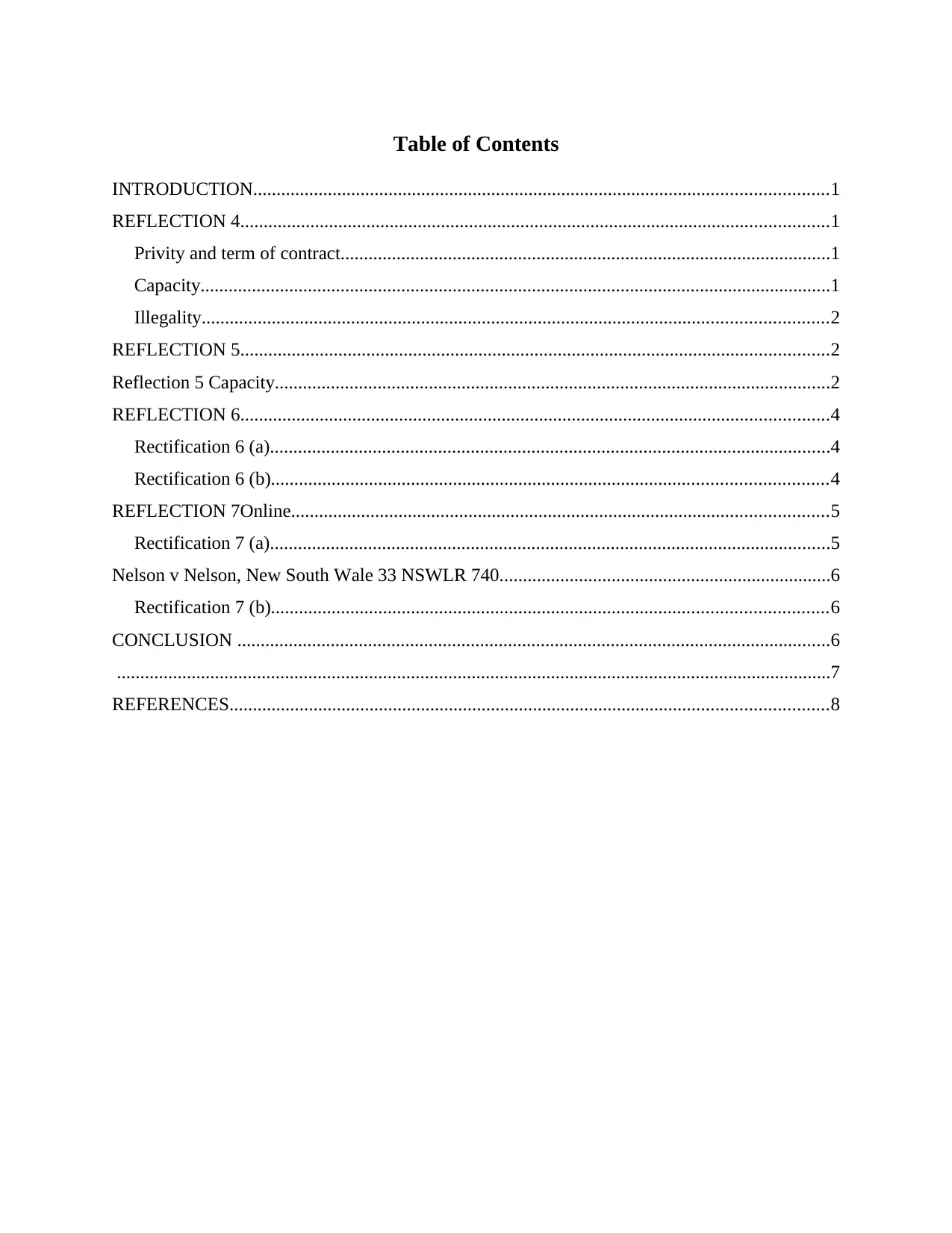
Table of Contents
INTRODUCTION...........................................................................................................................1
REFLECTION 4..............................................................................................................................1
Privity and term of contract.........................................................................................................1
Capacity.......................................................................................................................................1
Illegality......................................................................................................................................2
REFLECTION 5..............................................................................................................................2
Reflection 5 Capacity.......................................................................................................................2
REFLECTION 6..............................................................................................................................4
Rectification 6 (a)........................................................................................................................4
Rectification 6 (b).......................................................................................................................4
REFLECTION 7Online...................................................................................................................5
Rectification 7 (a)........................................................................................................................5
Nelson v Nelson, New South Wale 33 NSWLR 740.......................................................................6
Rectification 7 (b).......................................................................................................................6
CONCLUSION ...............................................................................................................................6
.........................................................................................................................................................7
REFERENCES................................................................................................................................8
INTRODUCTION...........................................................................................................................1
REFLECTION 4..............................................................................................................................1
Privity and term of contract.........................................................................................................1
Capacity.......................................................................................................................................1
Illegality......................................................................................................................................2
REFLECTION 5..............................................................................................................................2
Reflection 5 Capacity.......................................................................................................................2
REFLECTION 6..............................................................................................................................4
Rectification 6 (a)........................................................................................................................4
Rectification 6 (b).......................................................................................................................4
REFLECTION 7Online...................................................................................................................5
Rectification 7 (a)........................................................................................................................5
Nelson v Nelson, New South Wale 33 NSWLR 740.......................................................................6
Rectification 7 (b).......................................................................................................................6
CONCLUSION ...............................................................................................................................6
.........................................................................................................................................................7
REFERENCES................................................................................................................................8
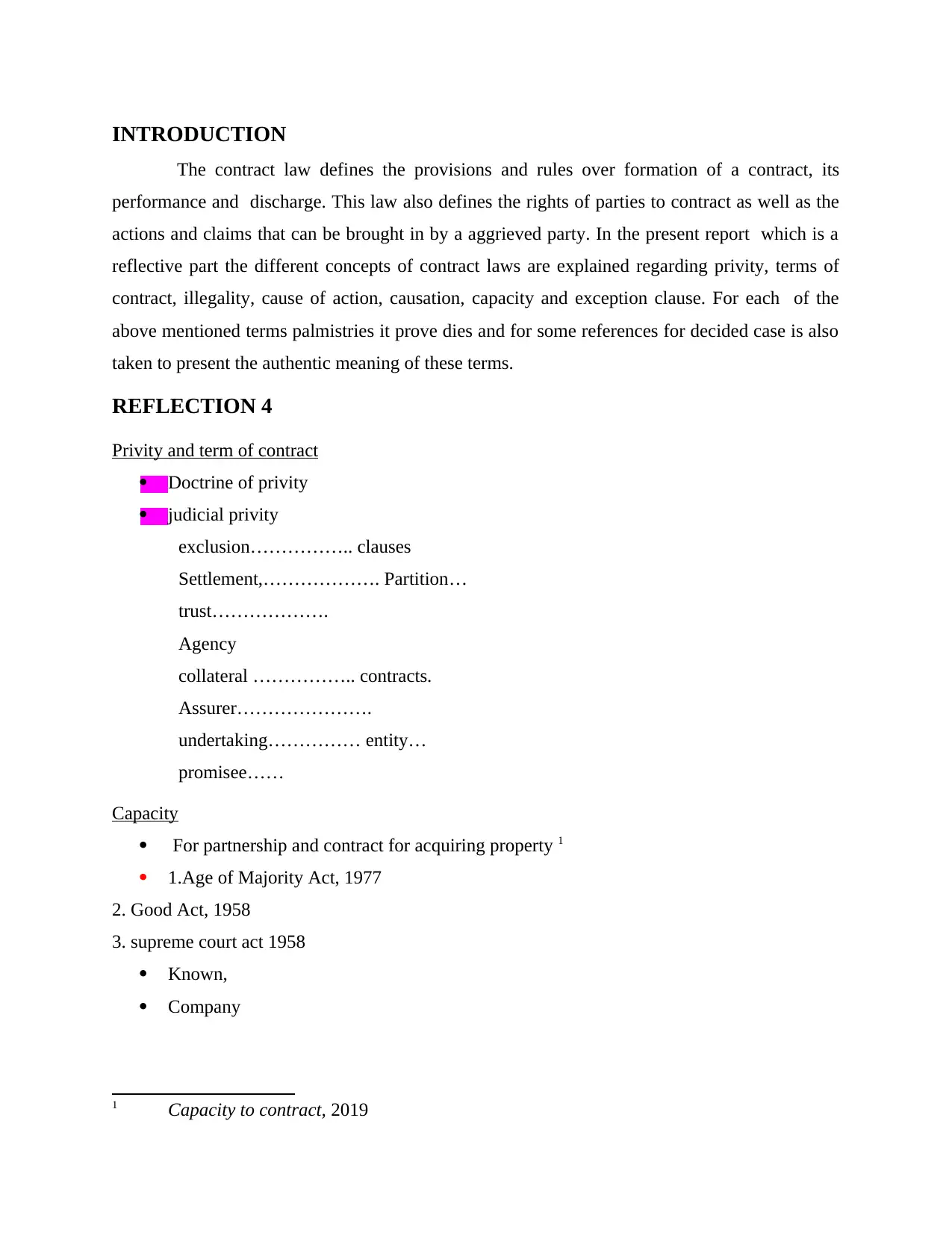
INTRODUCTION
The contract law defines the provisions and rules over formation of a contract, its
performance and discharge. This law also defines the rights of parties to contract as well as the
actions and claims that can be brought in by a aggrieved party. In the present report which is a
reflective part the different concepts of contract laws are explained regarding privity, terms of
contract, illegality, cause of action, causation, capacity and exception clause. For each of the
above mentioned terms palmistries it prove dies and for some references for decided case is also
taken to present the authentic meaning of these terms.
REFLECTION 4
Privity and term of contract
Doctrine of privity
judicial privity
exclusion…………….. clauses
Settlement,………………. Partition…
trust……………….
Agency
collateral …………….. contracts.
Assurer………………….
undertaking…………… entity…
promisee……
Capacity
For partnership and contract for acquiring property 1
1.Age of Majority Act, 1977
2. Good Act, 1958
3. supreme court act 1958
Known,
Company
1 Capacity to contract, 2019
The contract law defines the provisions and rules over formation of a contract, its
performance and discharge. This law also defines the rights of parties to contract as well as the
actions and claims that can be brought in by a aggrieved party. In the present report which is a
reflective part the different concepts of contract laws are explained regarding privity, terms of
contract, illegality, cause of action, causation, capacity and exception clause. For each of the
above mentioned terms palmistries it prove dies and for some references for decided case is also
taken to present the authentic meaning of these terms.
REFLECTION 4
Privity and term of contract
Doctrine of privity
judicial privity
exclusion…………….. clauses
Settlement,………………. Partition…
trust……………….
Agency
collateral …………….. contracts.
Assurer………………….
undertaking…………… entity…
promisee……
Capacity
For partnership and contract for acquiring property 1
1.Age of Majority Act, 1977
2. Good Act, 1958
3. supreme court act 1958
Known,
Company
1 Capacity to contract, 2019
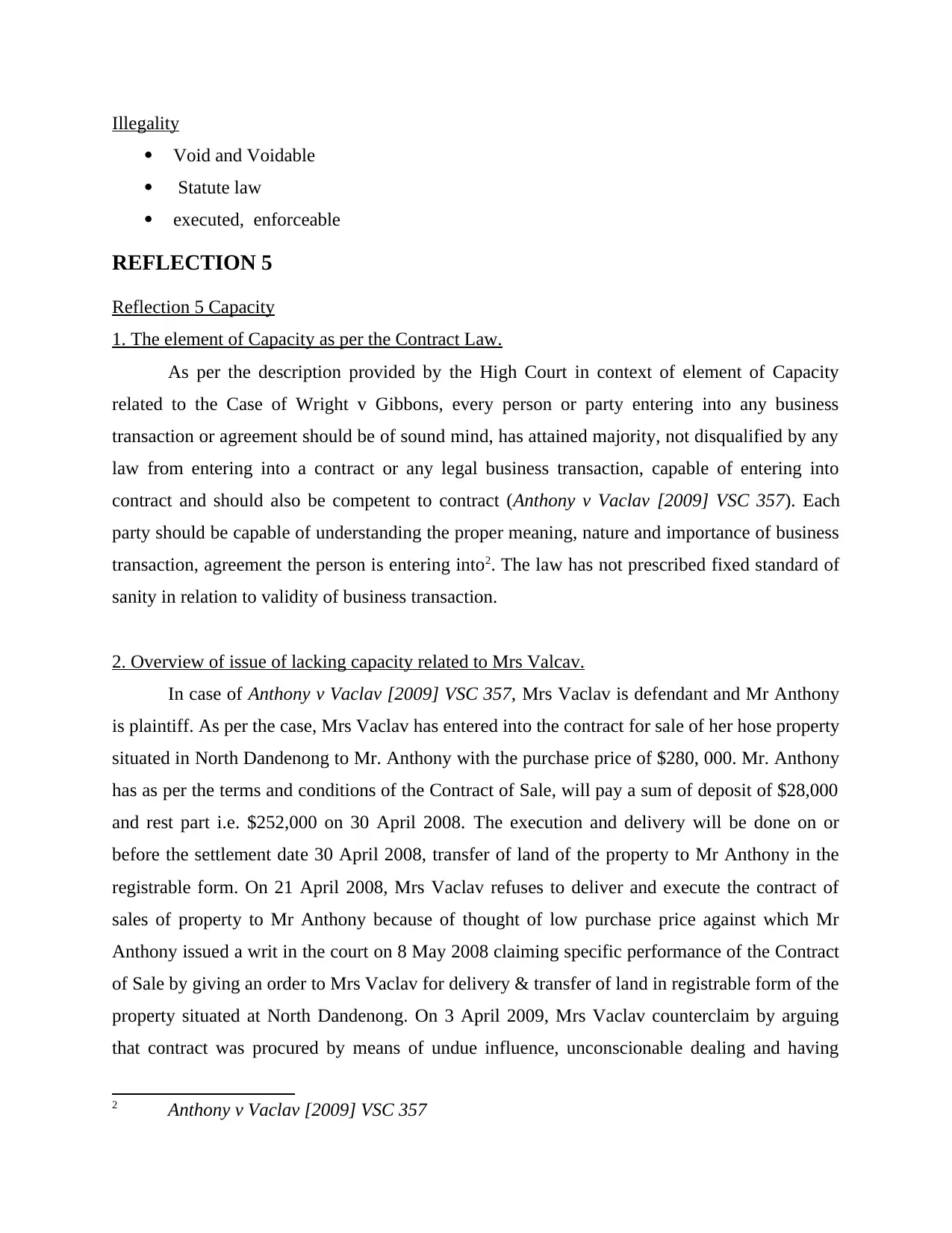
Illegality
Void and Voidable
Statute law
executed, enforceable
REFLECTION 5
Reflection 5 Capacity
1. The element of Capacity as per the Contract Law.
As per the description provided by the High Court in context of element of Capacity
related to the Case of Wright v Gibbons, every person or party entering into any business
transaction or agreement should be of sound mind, has attained majority, not disqualified by any
law from entering into a contract or any legal business transaction, capable of entering into
contract and should also be competent to contract (Anthony v Vaclav [2009] VSC 357). Each
party should be capable of understanding the proper meaning, nature and importance of business
transaction, agreement the person is entering into2. The law has not prescribed fixed standard of
sanity in relation to validity of business transaction.
2. Overview of issue of lacking capacity related to Mrs Valcav.
In case of Anthony v Vaclav [2009] VSC 357, Mrs Vaclav is defendant and Mr Anthony
is plaintiff. As per the case, Mrs Vaclav has entered into the contract for sale of her hose property
situated in North Dandenong to Mr. Anthony with the purchase price of $280, 000. Mr. Anthony
has as per the terms and conditions of the Contract of Sale, will pay a sum of deposit of $28,000
and rest part i.e. $252,000 on 30 April 2008. The execution and delivery will be done on or
before the settlement date 30 April 2008, transfer of land of the property to Mr Anthony in the
registrable form. On 21 April 2008, Mrs Vaclav refuses to deliver and execute the contract of
sales of property to Mr Anthony because of thought of low purchase price against which Mr
Anthony issued a writ in the court on 8 May 2008 claiming specific performance of the Contract
of Sale by giving an order to Mrs Vaclav for delivery & transfer of land in registrable form of the
property situated at North Dandenong. On 3 April 2009, Mrs Vaclav counterclaim by arguing
that contract was procured by means of undue influence, unconscionable dealing and having
2 Anthony v Vaclav [2009] VSC 357
Void and Voidable
Statute law
executed, enforceable
REFLECTION 5
Reflection 5 Capacity
1. The element of Capacity as per the Contract Law.
As per the description provided by the High Court in context of element of Capacity
related to the Case of Wright v Gibbons, every person or party entering into any business
transaction or agreement should be of sound mind, has attained majority, not disqualified by any
law from entering into a contract or any legal business transaction, capable of entering into
contract and should also be competent to contract (Anthony v Vaclav [2009] VSC 357). Each
party should be capable of understanding the proper meaning, nature and importance of business
transaction, agreement the person is entering into2. The law has not prescribed fixed standard of
sanity in relation to validity of business transaction.
2. Overview of issue of lacking capacity related to Mrs Valcav.
In case of Anthony v Vaclav [2009] VSC 357, Mrs Vaclav is defendant and Mr Anthony
is plaintiff. As per the case, Mrs Vaclav has entered into the contract for sale of her hose property
situated in North Dandenong to Mr. Anthony with the purchase price of $280, 000. Mr. Anthony
has as per the terms and conditions of the Contract of Sale, will pay a sum of deposit of $28,000
and rest part i.e. $252,000 on 30 April 2008. The execution and delivery will be done on or
before the settlement date 30 April 2008, transfer of land of the property to Mr Anthony in the
registrable form. On 21 April 2008, Mrs Vaclav refuses to deliver and execute the contract of
sales of property to Mr Anthony because of thought of low purchase price against which Mr
Anthony issued a writ in the court on 8 May 2008 claiming specific performance of the Contract
of Sale by giving an order to Mrs Vaclav for delivery & transfer of land in registrable form of the
property situated at North Dandenong. On 3 April 2009, Mrs Vaclav counterclaim by arguing
that contract was procured by means of undue influence, unconscionable dealing and having
2 Anthony v Vaclav [2009] VSC 357
Secure Best Marks with AI Grader
Need help grading? Try our AI Grader for instant feedback on your assignments.
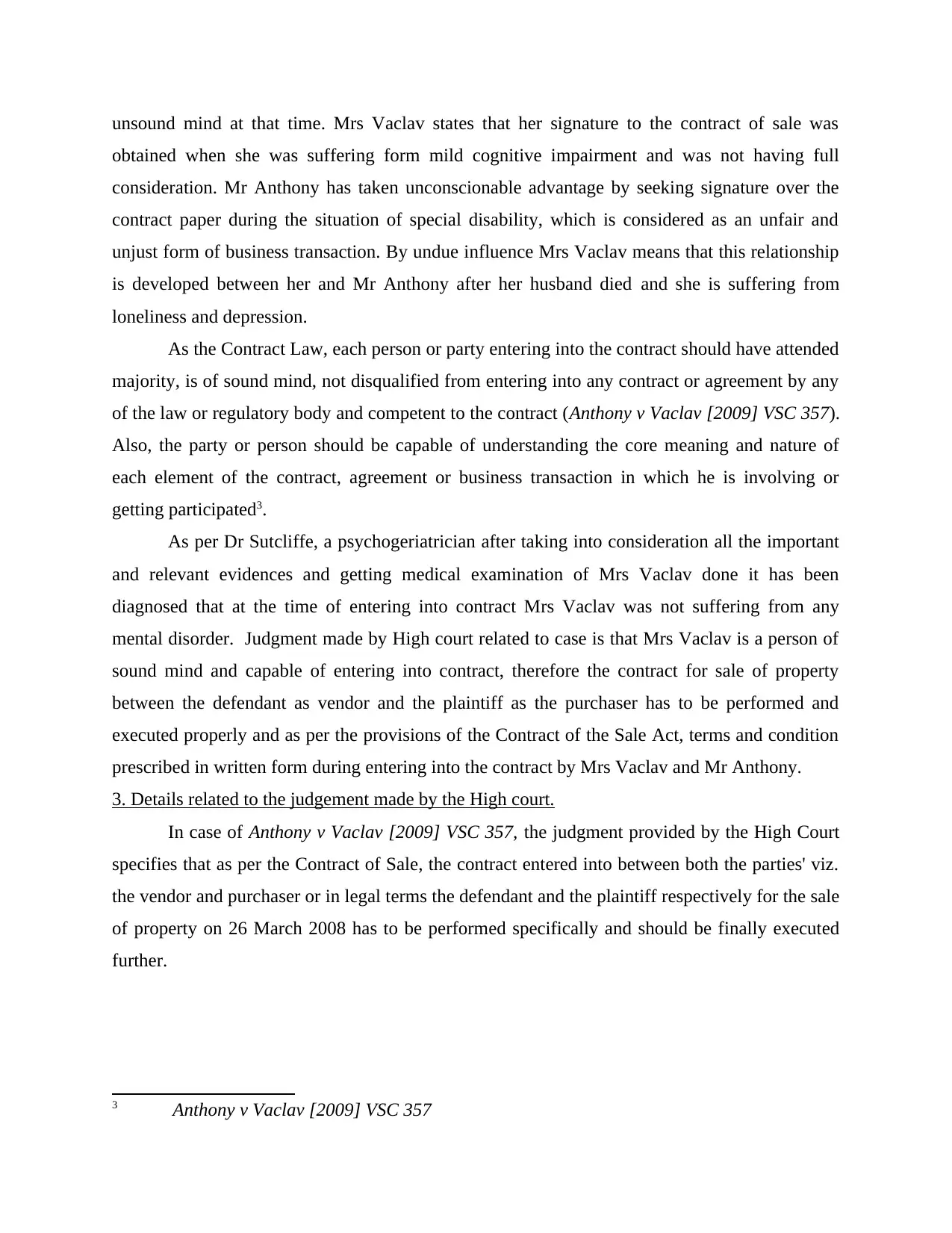
unsound mind at that time. Mrs Vaclav states that her signature to the contract of sale was
obtained when she was suffering form mild cognitive impairment and was not having full
consideration. Mr Anthony has taken unconscionable advantage by seeking signature over the
contract paper during the situation of special disability, which is considered as an unfair and
unjust form of business transaction. By undue influence Mrs Vaclav means that this relationship
is developed between her and Mr Anthony after her husband died and she is suffering from
loneliness and depression.
As the Contract Law, each person or party entering into the contract should have attended
majority, is of sound mind, not disqualified from entering into any contract or agreement by any
of the law or regulatory body and competent to the contract (Anthony v Vaclav [2009] VSC 357).
Also, the party or person should be capable of understanding the core meaning and nature of
each element of the contract, agreement or business transaction in which he is involving or
getting participated3.
As per Dr Sutcliffe, a psychogeriatrician after taking into consideration all the important
and relevant evidences and getting medical examination of Mrs Vaclav done it has been
diagnosed that at the time of entering into contract Mrs Vaclav was not suffering from any
mental disorder. Judgment made by High court related to case is that Mrs Vaclav is a person of
sound mind and capable of entering into contract, therefore the contract for sale of property
between the defendant as vendor and the plaintiff as the purchaser has to be performed and
executed properly and as per the provisions of the Contract of the Sale Act, terms and condition
prescribed in written form during entering into the contract by Mrs Vaclav and Mr Anthony.
3. Details related to the judgement made by the High court.
In case of Anthony v Vaclav [2009] VSC 357, the judgment provided by the High Court
specifies that as per the Contract of Sale, the contract entered into between both the parties' viz.
the vendor and purchaser or in legal terms the defendant and the plaintiff respectively for the sale
of property on 26 March 2008 has to be performed specifically and should be finally executed
further.
3 Anthony v Vaclav [2009] VSC 357
obtained when she was suffering form mild cognitive impairment and was not having full
consideration. Mr Anthony has taken unconscionable advantage by seeking signature over the
contract paper during the situation of special disability, which is considered as an unfair and
unjust form of business transaction. By undue influence Mrs Vaclav means that this relationship
is developed between her and Mr Anthony after her husband died and she is suffering from
loneliness and depression.
As the Contract Law, each person or party entering into the contract should have attended
majority, is of sound mind, not disqualified from entering into any contract or agreement by any
of the law or regulatory body and competent to the contract (Anthony v Vaclav [2009] VSC 357).
Also, the party or person should be capable of understanding the core meaning and nature of
each element of the contract, agreement or business transaction in which he is involving or
getting participated3.
As per Dr Sutcliffe, a psychogeriatrician after taking into consideration all the important
and relevant evidences and getting medical examination of Mrs Vaclav done it has been
diagnosed that at the time of entering into contract Mrs Vaclav was not suffering from any
mental disorder. Judgment made by High court related to case is that Mrs Vaclav is a person of
sound mind and capable of entering into contract, therefore the contract for sale of property
between the defendant as vendor and the plaintiff as the purchaser has to be performed and
executed properly and as per the provisions of the Contract of the Sale Act, terms and condition
prescribed in written form during entering into the contract by Mrs Vaclav and Mr Anthony.
3. Details related to the judgement made by the High court.
In case of Anthony v Vaclav [2009] VSC 357, the judgment provided by the High Court
specifies that as per the Contract of Sale, the contract entered into between both the parties' viz.
the vendor and purchaser or in legal terms the defendant and the plaintiff respectively for the sale
of property on 26 March 2008 has to be performed specifically and should be finally executed
further.
3 Anthony v Vaclav [2009] VSC 357
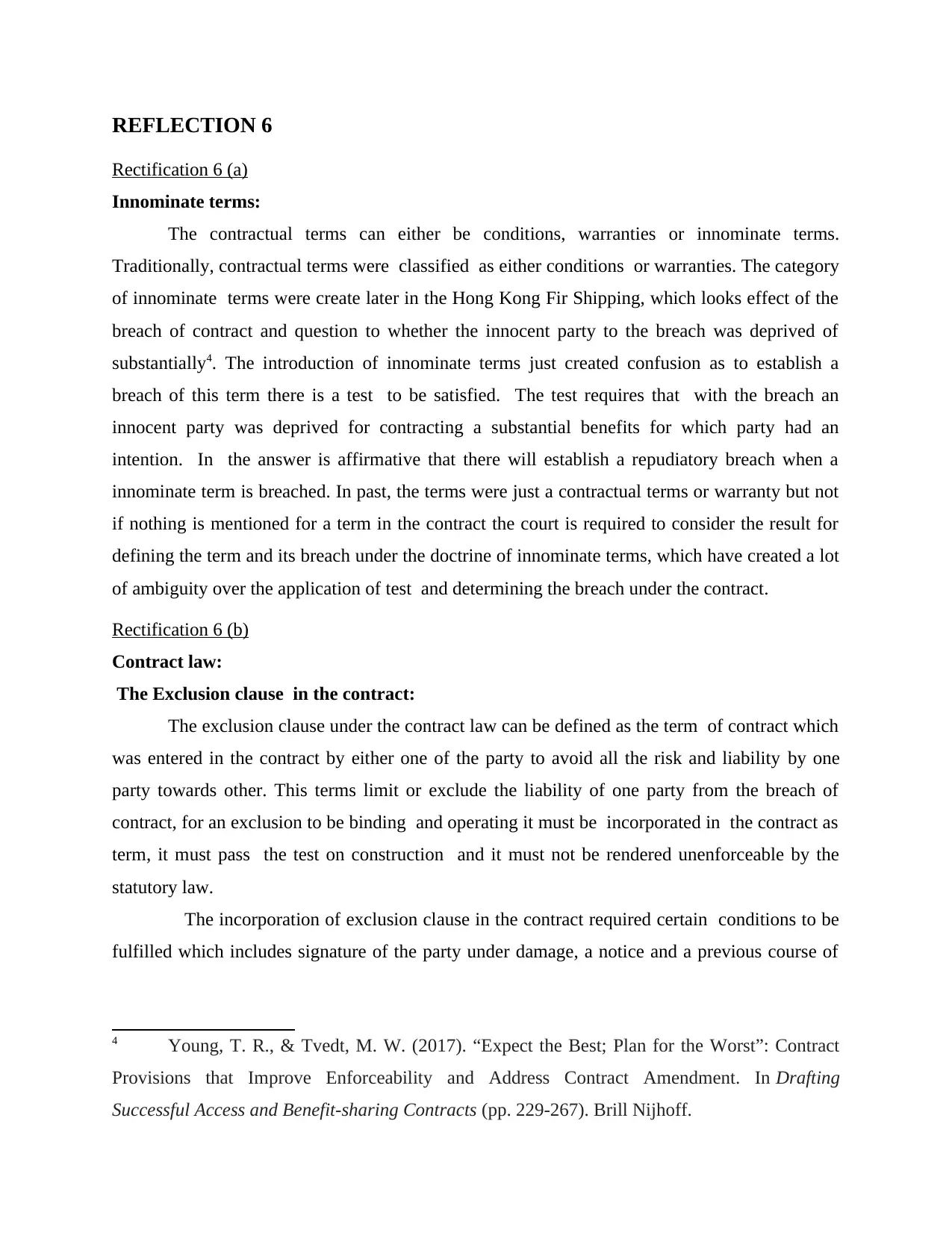
REFLECTION 6
Rectification 6 (a)
Innominate terms:
The contractual terms can either be conditions, warranties or innominate terms.
Traditionally, contractual terms were classified as either conditions or warranties. The category
of innominate terms were create later in the Hong Kong Fir Shipping, which looks effect of the
breach of contract and question to whether the innocent party to the breach was deprived of
substantially4. The introduction of innominate terms just created confusion as to establish a
breach of this term there is a test to be satisfied. The test requires that with the breach an
innocent party was deprived for contracting a substantial benefits for which party had an
intention. In the answer is affirmative that there will establish a repudiatory breach when a
innominate term is breached. In past, the terms were just a contractual terms or warranty but not
if nothing is mentioned for a term in the contract the court is required to consider the result for
defining the term and its breach under the doctrine of innominate terms, which have created a lot
of ambiguity over the application of test and determining the breach under the contract.
Rectification 6 (b)
Contract law:
The Exclusion clause in the contract:
The exclusion clause under the contract law can be defined as the term of contract which
was entered in the contract by either one of the party to avoid all the risk and liability by one
party towards other. This terms limit or exclude the liability of one party from the breach of
contract, for an exclusion to be binding and operating it must be incorporated in the contract as
term, it must pass the test on construction and it must not be rendered unenforceable by the
statutory law.
The incorporation of exclusion clause in the contract required certain conditions to be
fulfilled which includes signature of the party under damage, a notice and a previous course of
4 Young, T. R., & Tvedt, M. W. (2017). “Expect the Best; Plan for the Worst”: Contract
Provisions that Improve Enforceability and Address Contract Amendment. In Drafting
Successful Access and Benefit-sharing Contracts (pp. 229-267). Brill Nijhoff.
Rectification 6 (a)
Innominate terms:
The contractual terms can either be conditions, warranties or innominate terms.
Traditionally, contractual terms were classified as either conditions or warranties. The category
of innominate terms were create later in the Hong Kong Fir Shipping, which looks effect of the
breach of contract and question to whether the innocent party to the breach was deprived of
substantially4. The introduction of innominate terms just created confusion as to establish a
breach of this term there is a test to be satisfied. The test requires that with the breach an
innocent party was deprived for contracting a substantial benefits for which party had an
intention. In the answer is affirmative that there will establish a repudiatory breach when a
innominate term is breached. In past, the terms were just a contractual terms or warranty but not
if nothing is mentioned for a term in the contract the court is required to consider the result for
defining the term and its breach under the doctrine of innominate terms, which have created a lot
of ambiguity over the application of test and determining the breach under the contract.
Rectification 6 (b)
Contract law:
The Exclusion clause in the contract:
The exclusion clause under the contract law can be defined as the term of contract which
was entered in the contract by either one of the party to avoid all the risk and liability by one
party towards other. This terms limit or exclude the liability of one party from the breach of
contract, for an exclusion to be binding and operating it must be incorporated in the contract as
term, it must pass the test on construction and it must not be rendered unenforceable by the
statutory law.
The incorporation of exclusion clause in the contract required certain conditions to be
fulfilled which includes signature of the party under damage, a notice and a previous course of
4 Young, T. R., & Tvedt, M. W. (2017). “Expect the Best; Plan for the Worst”: Contract
Provisions that Improve Enforceability and Address Contract Amendment. In Drafting
Successful Access and Benefit-sharing Contracts (pp. 229-267). Brill Nijhoff.
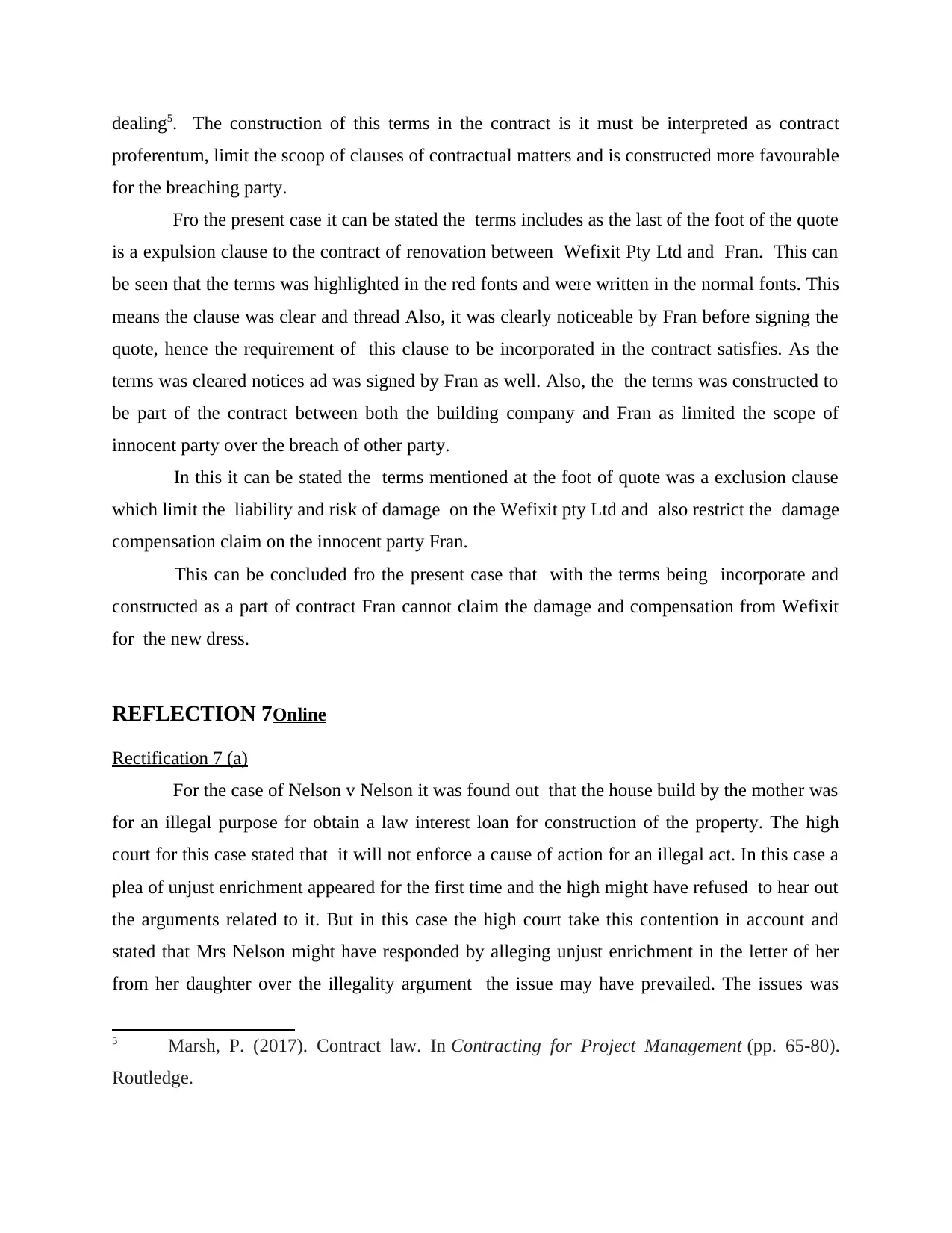
dealing5. The construction of this terms in the contract is it must be interpreted as contract
proferentum, limit the scoop of clauses of contractual matters and is constructed more favourable
for the breaching party.
Fro the present case it can be stated the terms includes as the last of the foot of the quote
is a expulsion clause to the contract of renovation between Wefixit Pty Ltd and Fran. This can
be seen that the terms was highlighted in the red fonts and were written in the normal fonts. This
means the clause was clear and thread Also, it was clearly noticeable by Fran before signing the
quote, hence the requirement of this clause to be incorporated in the contract satisfies. As the
terms was cleared notices ad was signed by Fran as well. Also, the the terms was constructed to
be part of the contract between both the building company and Fran as limited the scope of
innocent party over the breach of other party.
In this it can be stated the terms mentioned at the foot of quote was a exclusion clause
which limit the liability and risk of damage on the Wefixit pty Ltd and also restrict the damage
compensation claim on the innocent party Fran.
This can be concluded fro the present case that with the terms being incorporate and
constructed as a part of contract Fran cannot claim the damage and compensation from Wefixit
for the new dress.
REFLECTION 7Online
Rectification 7 (a)
For the case of Nelson v Nelson it was found out that the house build by the mother was
for an illegal purpose for obtain a law interest loan for construction of the property. The high
court for this case stated that it will not enforce a cause of action for an illegal act. In this case a
plea of unjust enrichment appeared for the first time and the high might have refused to hear out
the arguments related to it. But in this case the high court take this contention in account and
stated that Mrs Nelson might have responded by alleging unjust enrichment in the letter of her
from her daughter over the illegality argument the issue may have prevailed. The issues was
5 Marsh, P. (2017). Contract law. In Contracting for Project Management (pp. 65-80).
Routledge.
proferentum, limit the scoop of clauses of contractual matters and is constructed more favourable
for the breaching party.
Fro the present case it can be stated the terms includes as the last of the foot of the quote
is a expulsion clause to the contract of renovation between Wefixit Pty Ltd and Fran. This can
be seen that the terms was highlighted in the red fonts and were written in the normal fonts. This
means the clause was clear and thread Also, it was clearly noticeable by Fran before signing the
quote, hence the requirement of this clause to be incorporated in the contract satisfies. As the
terms was cleared notices ad was signed by Fran as well. Also, the the terms was constructed to
be part of the contract between both the building company and Fran as limited the scope of
innocent party over the breach of other party.
In this it can be stated the terms mentioned at the foot of quote was a exclusion clause
which limit the liability and risk of damage on the Wefixit pty Ltd and also restrict the damage
compensation claim on the innocent party Fran.
This can be concluded fro the present case that with the terms being incorporate and
constructed as a part of contract Fran cannot claim the damage and compensation from Wefixit
for the new dress.
REFLECTION 7Online
Rectification 7 (a)
For the case of Nelson v Nelson it was found out that the house build by the mother was
for an illegal purpose for obtain a law interest loan for construction of the property. The high
court for this case stated that it will not enforce a cause of action for an illegal act. In this case a
plea of unjust enrichment appeared for the first time and the high might have refused to hear out
the arguments related to it. But in this case the high court take this contention in account and
stated that Mrs Nelson might have responded by alleging unjust enrichment in the letter of her
from her daughter over the illegality argument the issue may have prevailed. The issues was
5 Marsh, P. (2017). Contract law. In Contracting for Project Management (pp. 65-80).
Routledge.
Paraphrase This Document
Need a fresh take? Get an instant paraphrase of this document with our AI Paraphraser
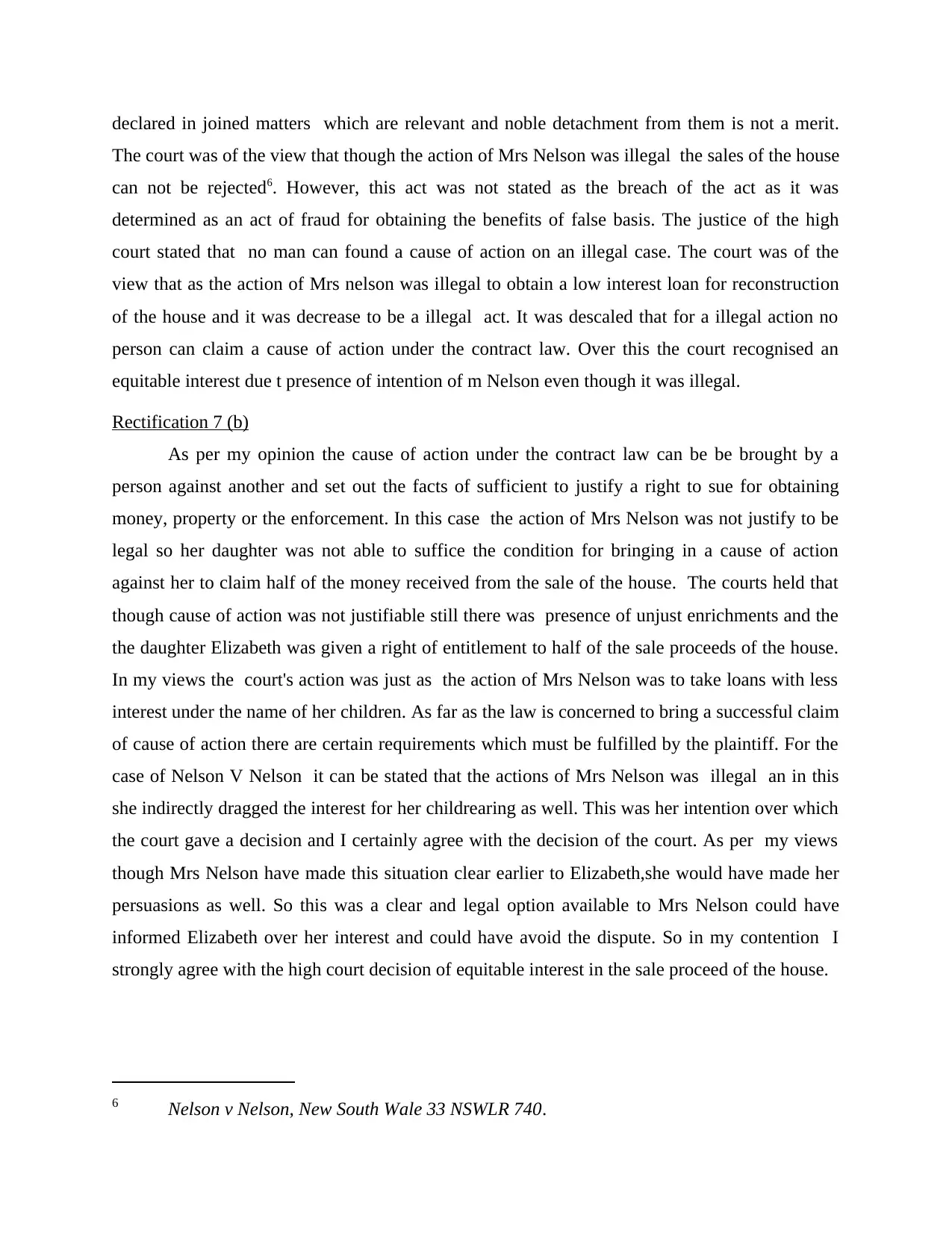
declared in joined matters which are relevant and noble detachment from them is not a merit.
The court was of the view that though the action of Mrs Nelson was illegal the sales of the house
can not be rejected6. However, this act was not stated as the breach of the act as it was
determined as an act of fraud for obtaining the benefits of false basis. The justice of the high
court stated that no man can found a cause of action on an illegal case. The court was of the
view that as the action of Mrs nelson was illegal to obtain a low interest loan for reconstruction
of the house and it was decrease to be a illegal act. It was descaled that for a illegal action no
person can claim a cause of action under the contract law. Over this the court recognised an
equitable interest due t presence of intention of m Nelson even though it was illegal.
Rectification 7 (b)
As per my opinion the cause of action under the contract law can be be brought by a
person against another and set out the facts of sufficient to justify a right to sue for obtaining
money, property or the enforcement. In this case the action of Mrs Nelson was not justify to be
legal so her daughter was not able to suffice the condition for bringing in a cause of action
against her to claim half of the money received from the sale of the house. The courts held that
though cause of action was not justifiable still there was presence of unjust enrichments and the
the daughter Elizabeth was given a right of entitlement to half of the sale proceeds of the house.
In my views the court's action was just as the action of Mrs Nelson was to take loans with less
interest under the name of her children. As far as the law is concerned to bring a successful claim
of cause of action there are certain requirements which must be fulfilled by the plaintiff. For the
case of Nelson V Nelson it can be stated that the actions of Mrs Nelson was illegal an in this
she indirectly dragged the interest for her childrearing as well. This was her intention over which
the court gave a decision and I certainly agree with the decision of the court. As per my views
though Mrs Nelson have made this situation clear earlier to Elizabeth,she would have made her
persuasions as well. So this was a clear and legal option available to Mrs Nelson could have
informed Elizabeth over her interest and could have avoid the dispute. So in my contention I
strongly agree with the high court decision of equitable interest in the sale proceed of the house.
6 Nelson v Nelson, New South Wale 33 NSWLR 740.
The court was of the view that though the action of Mrs Nelson was illegal the sales of the house
can not be rejected6. However, this act was not stated as the breach of the act as it was
determined as an act of fraud for obtaining the benefits of false basis. The justice of the high
court stated that no man can found a cause of action on an illegal case. The court was of the
view that as the action of Mrs nelson was illegal to obtain a low interest loan for reconstruction
of the house and it was decrease to be a illegal act. It was descaled that for a illegal action no
person can claim a cause of action under the contract law. Over this the court recognised an
equitable interest due t presence of intention of m Nelson even though it was illegal.
Rectification 7 (b)
As per my opinion the cause of action under the contract law can be be brought by a
person against another and set out the facts of sufficient to justify a right to sue for obtaining
money, property or the enforcement. In this case the action of Mrs Nelson was not justify to be
legal so her daughter was not able to suffice the condition for bringing in a cause of action
against her to claim half of the money received from the sale of the house. The courts held that
though cause of action was not justifiable still there was presence of unjust enrichments and the
the daughter Elizabeth was given a right of entitlement to half of the sale proceeds of the house.
In my views the court's action was just as the action of Mrs Nelson was to take loans with less
interest under the name of her children. As far as the law is concerned to bring a successful claim
of cause of action there are certain requirements which must be fulfilled by the plaintiff. For the
case of Nelson V Nelson it can be stated that the actions of Mrs Nelson was illegal an in this
she indirectly dragged the interest for her childrearing as well. This was her intention over which
the court gave a decision and I certainly agree with the decision of the court. As per my views
though Mrs Nelson have made this situation clear earlier to Elizabeth,she would have made her
persuasions as well. So this was a clear and legal option available to Mrs Nelson could have
informed Elizabeth over her interest and could have avoid the dispute. So in my contention I
strongly agree with the high court decision of equitable interest in the sale proceed of the house.
6 Nelson v Nelson, New South Wale 33 NSWLR 740.
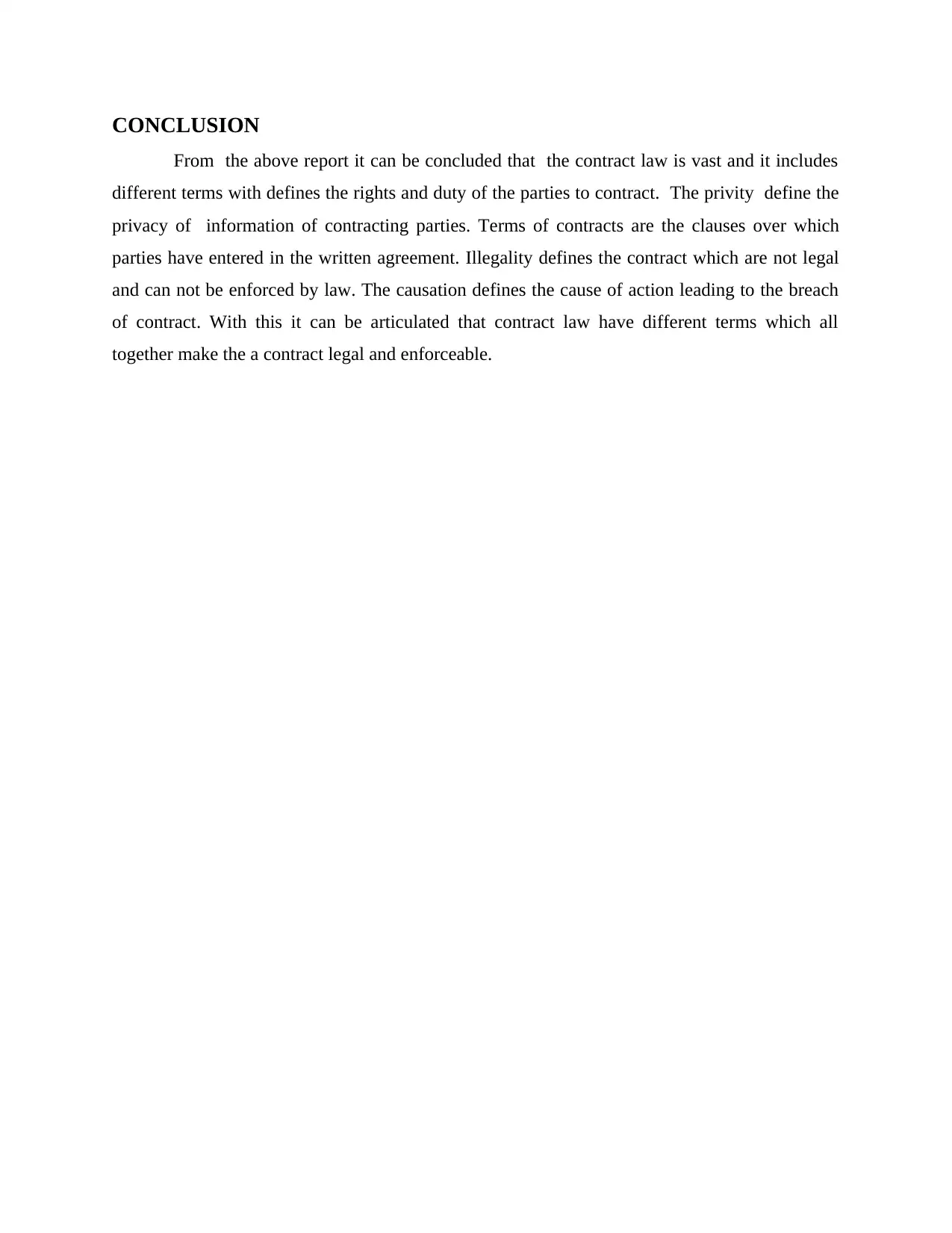
CONCLUSION
From the above report it can be concluded that the contract law is vast and it includes
different terms with defines the rights and duty of the parties to contract. The privity define the
privacy of information of contracting parties. Terms of contracts are the clauses over which
parties have entered in the written agreement. Illegality defines the contract which are not legal
and can not be enforced by law. The causation defines the cause of action leading to the breach
of contract. With this it can be articulated that contract law have different terms which all
together make the a contract legal and enforceable.
From the above report it can be concluded that the contract law is vast and it includes
different terms with defines the rights and duty of the parties to contract. The privity define the
privacy of information of contracting parties. Terms of contracts are the clauses over which
parties have entered in the written agreement. Illegality defines the contract which are not legal
and can not be enforced by law. The causation defines the cause of action leading to the breach
of contract. With this it can be articulated that contract law have different terms which all
together make the a contract legal and enforceable.
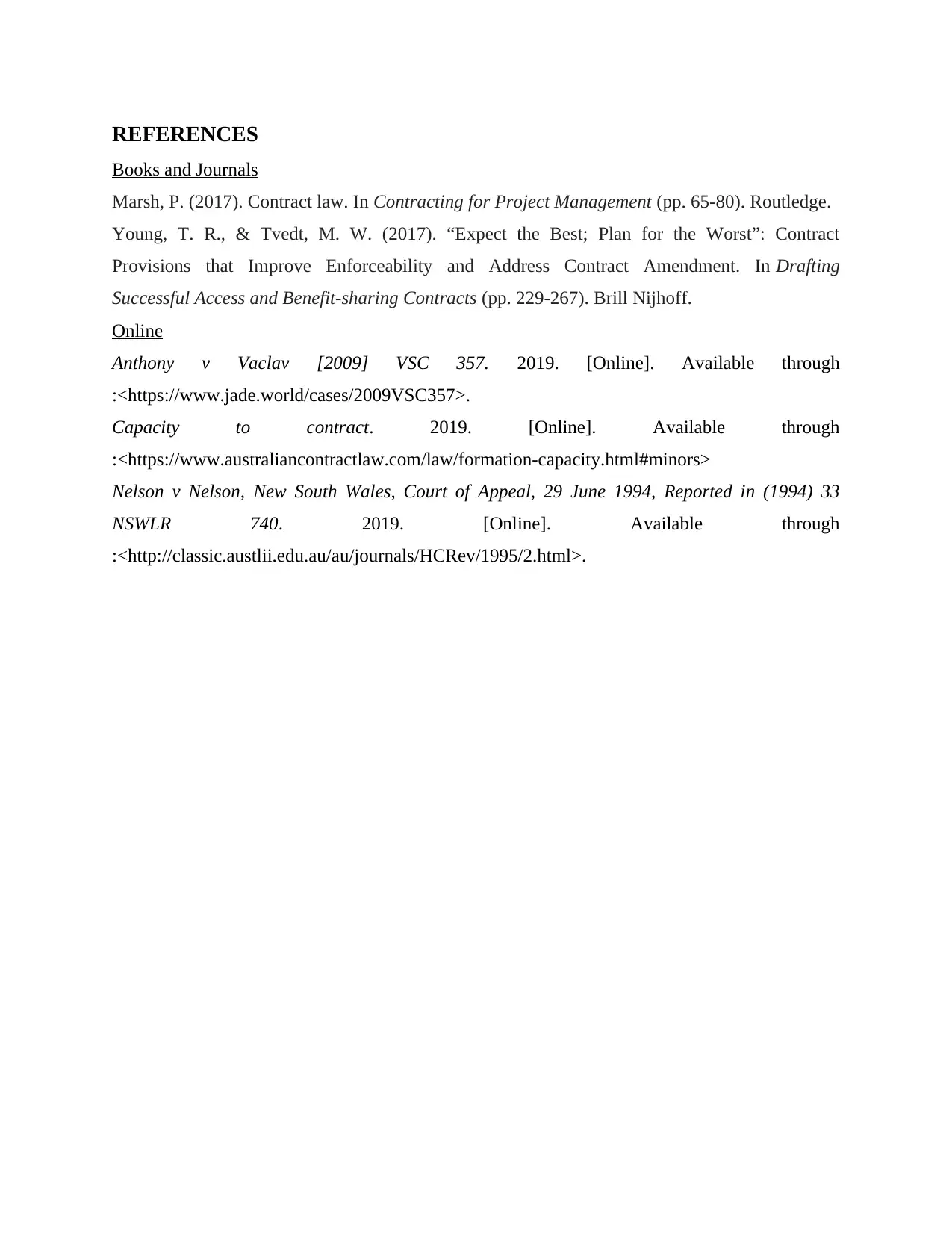
REFERENCES
Books and Journals
Marsh, P. (2017). Contract law. In Contracting for Project Management (pp. 65-80). Routledge.
Young, T. R., & Tvedt, M. W. (2017). “Expect the Best; Plan for the Worst”: Contract
Provisions that Improve Enforceability and Address Contract Amendment. In Drafting
Successful Access and Benefit-sharing Contracts (pp. 229-267). Brill Nijhoff.
Online
Anthony v Vaclav [2009] VSC 357. 2019. [Online]. Available through
:<https://www.jade.world/cases/2009VSC357>.
Capacity to contract. 2019. [Online]. Available through
:<https://www.australiancontractlaw.com/law/formation-capacity.html#minors>
Nelson v Nelson, New South Wales, Court of Appeal, 29 June 1994, Reported in (1994) 33
NSWLR 740. 2019. [Online]. Available through
:<http://classic.austlii.edu.au/au/journals/HCRev/1995/2.html>.
Books and Journals
Marsh, P. (2017). Contract law. In Contracting for Project Management (pp. 65-80). Routledge.
Young, T. R., & Tvedt, M. W. (2017). “Expect the Best; Plan for the Worst”: Contract
Provisions that Improve Enforceability and Address Contract Amendment. In Drafting
Successful Access and Benefit-sharing Contracts (pp. 229-267). Brill Nijhoff.
Online
Anthony v Vaclav [2009] VSC 357. 2019. [Online]. Available through
:<https://www.jade.world/cases/2009VSC357>.
Capacity to contract. 2019. [Online]. Available through
:<https://www.australiancontractlaw.com/law/formation-capacity.html#minors>
Nelson v Nelson, New South Wales, Court of Appeal, 29 June 1994, Reported in (1994) 33
NSWLR 740. 2019. [Online]. Available through
:<http://classic.austlii.edu.au/au/journals/HCRev/1995/2.html>.
1 out of 10
Your All-in-One AI-Powered Toolkit for Academic Success.
+13062052269
info@desklib.com
Available 24*7 on WhatsApp / Email
![[object Object]](/_next/static/media/star-bottom.7253800d.svg)
Unlock your academic potential
© 2024 | Zucol Services PVT LTD | All rights reserved.